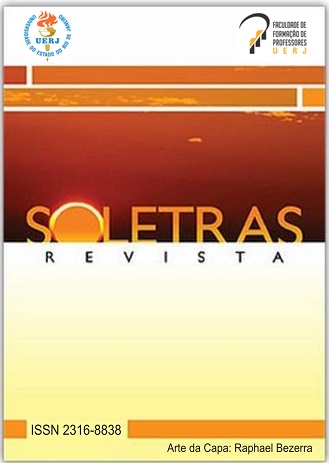Horacio Quiroga e o decadentismo: A masculinidade subversiva em Flor de Imperio
DOI:
https://doi.org/10.12957/soletras.2025.91995Palavras-chave:
Decadentismo latino-americano, Queer latino-americano, Horacio QuirogaResumo
Horacio Quiroga consagrou-se como um dos mestres do conto latino-americano graças às suas narrativas regionalistas e de horror. Entretanto, sua produção inicial revela uma fase marcadamente influenciada pelo esteticismo modernista e pela sensibilidade decadentista finissecular, sobretudo na antologia El crimen del otro. Este artigo analisa um dos contos desta obra, Flor de Imperio (1902), negligenciado pela crítica e que se destaca devido à sua divergência temática frente aos textos que consolidaram o autor. Objetiva-se examinar como o Quiroga decadentista subverte a masculinidade hegemônica, articulando essa transgressão às transformações socioculturais do continente na virada do século XX. O referencial teórico baseia-se em Silvia Molloy, José Quiroga, Ben Sifuentes-Jáuregui, Mario Praz e Emir Monegal, debatendo o desejo queer e a estética decadentista. A análise demonstrou que o protagonista do conto apresenta uma masculinidade dissidente que contesta o padrão do sujeito moderno latino-americano. Apesar do conservadorismo dominante na época, escritores como Quiroga lograram incorporar visões progressistas sobre gênero e sexualidade, mesmo que indiretamente. As performances como as apresentadas nesta narrativa podem ser lidas como metonímias de uma identidade nacional, por encenarem tanto o desejo mimético do cosmopolitismo quanto a ansiedade gerada por essa imitação, revelando fissuras no projeto modernizador da região.
Downloads
Publicado
Edição
Seção
Licença
A aprovação dos artigos implica a cessão imediata e sem ônus dos direitos de publicação nesta revista. O(s) autor(es) autoriza(m) ao Programa de Pós-graduação em Letras e Linguística (PPLIN) a reproduzi-lo e publicá-lo na revista SOLETRAS, entendendo-se os termos “reprodução” e “publicação” conforme definição do artigo 5° da Lei 9610/98. O(s) autor(es) continuará(rão) a ter os direitos autorais para publicações posteriores. O artigo poderá ser acessado pela rede mundial de computadores (http://www.e-publicacoes.uerj.br/index.php/soletras), sendo permitidas, a título gratuito, a consulta e a reprodução de exemplar do artigo para uso próprio de quem o consulta. Casos de plágio ou quaisquer ilegalidades nos textos apresentados são de inteira responsabilidade de seus autores.



